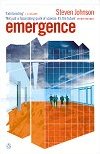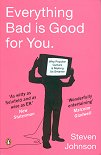Modern culture (TV, video games, etc) is just degenerate mindless
drivel, appealing to the lowest common denominator, and turning us all
into mindless couch potato zombies. Right?
Wrong! Johnson argues persuasively that popular culture is not only
getting more complex and sophisticated, it is increasing (certain aspects
of) its consumers' intelligence. It's just that we evaluate its surface
content, not its deeper cognitive structure, when coming to our knee-jerk
assessments of its value. We also evaluate it in the context of older
culture, such as reading, and see only the downsides, not its upsides. (He
has an amusing riff on what people would be saying about the impoverished
experience of reading books, if books had been introduced after video
games.) Johnson argues the the Flynn
Effect (a general rise in IQ levels over the decades) is due
in some part to the fact that we are living in a more complex environment,
not least of which is a result of this increased cultural complexity.
He dissects video games, and shows that far from being "instant
gratification", most look more like pure hard work. He
suspects that people who condemn these as being "trivial" can't
have tried to play one. He also analyses the complex problem solving, and
problem exploring, skills such games require. In many games, what you have
to do is to work out what you have to do! You have to explore the world,
try things, probe the possibilities. This hones a skill-set very valuable
when encountering the complex layers of new technology in the real world,
and may help to explain why people brought up on these games are so much
more fluent in their interactions with that technology: they have learnt
techniques to find out how the world works. (This could help explain why
people don't read manuals: you don't consult the "cheat sheet"
until you've tried sufficiently hard to solve the problem yourself.)
He similarly dissects TV shows, demonstrating how they have got
massively more complex over the decades. They have moved from simple
linear plotlines, to complex interwoven structures. And at the same time,
the "flashing arrow" cues to help the viewer navigate have been
reduced, or even removed completely. This means current TV shows require
considerably more concentration and involvement from the viewer:
you can't just "veg out" in front of shows like 24 or
The Sopranos, you have to think, to construct models of what's
going on, in order to understand them. Yet a show like The Sopranos,
which 30 years ago would have been way too sophisticated for even niche
viewers, is today a prime time hit. So it isn't just an elite few watching
shows like this.
Part of this is driven by the technology: successful TV shows make more
in syndication and DVD sales than they do on first runs. This means that
popular shows need to support multiple viewings, which not merely allows
them, but requires them, to be more complex and sophisticated:
full of in-jokes, obscure references, complex out-of-order plot lines, and
so on.
Even the much-derided "reality TV" is cognitively challenging:
following a show like The Apprentice requires understanding of
complex social networks: who likes whom, who is tricking whom, and so on.
And this in turn leads to fan sites full of discussions and analyses of
these shows.
So this is a very positive message. This much-derided culture is
actually making us smarter! But it is making us smarter in specific ways.
Reality shows and complex plotlines encourage analysis of social networks
and increase our emotional intelligence. Video games encourage "probing"
the system to discover what the rules are and how the world works. These
are different ways of understanding the world from those taught in the
more conventional educational systems, with their more bottom-up,
accretive style of learning. This book seems to imply that current
students would fare better being dumped in a rich immersive learning
environment, and allowed to build up their knowledge and skills by
exploring it. They might learn a lot more about it this way. But such
worlds would have to be designed so that the rules discovered are the
right ones, not merely contingent special cases caused by bugs in the
system!




